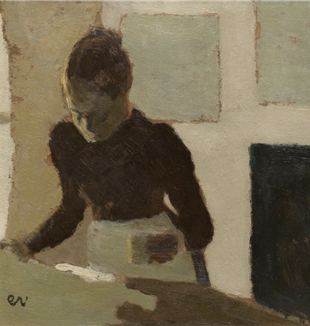
Illness as Someone Who Comes
The witness of a wife and mother living with MS: “It is the very sickness that Christ gives me that heals.”If the Christmas tree at Rockefeller Center were
A billion times bigger, and you laid it
Flat down in the dark, and
With a steam roller waist-high to God and heavy as
The Rocky Mountains, flattened it out thin as paper, but
Never broke a single damned colored light bulb, and they were all
Blazing in the dark, that would be the way it is . . .
— from “Homage to Emerson, On Night Flight to New York,” Robert Penn Warren, 1966
It was my first year back in the classroom following an absence for graduate school, and I noticed the constant and enflamed adolescent buzz from my students seemed less insistent. Huh. Maybe I need to get my ears cleaned, I thought. I was twenty-eight years old.
A few weeks later I was in a sound booth at the ENT, wearing bulbous headphones while doing a poor man’s Saturday Night Fever routine to the dinging intonations in my ear. Beep. Left hand. Beep, beep. Left hand. Beep. Beep. Left, left, left. Later, upstairs in the doctor’s office, feeling small with legs swinging heavily from the exam table, he told me I had single-sided deafness. One hundred percent loss in my right ear. I am ordering an MRI, he said, to check for a brain tumor.
I felt shocked. Not by the possible brain tumor but by such a shoddy bedside manner. Huh, I thought again. I called a friend, who called another friend, who then called another friend. Through this cloud of witnesses, I found myself in front of a research neurologist at Johns Hopkins in Baltimore. He put me on repeated rounds of intravenous steroids, which made the swelling of one of the lesions subside. My hearing fully returned, and I had been diagnosed with multiple sclerosis.
Years have passed, and since then, depending on where our family has relocated, I have had somewhat regular MRIs. Each has shown the lesions throughout my brain and spinal cord have multiplied. Yet still, my only symptom has been that initial hearing loss. Following our last move a year ago, and then having to wait a year after the referral to get an appointment to see the local neurologist, I saw a doctor for my MS this past week. After looking through the records sent from Johns Hopkins, he turned to me and said, I would have expected you to be in a wheelchair. You are a miracle. What went through my head in that moment, although I did not say it aloud was: Of course I am. But isn’t everyone?
Through all this, in moments of clarity lived “at the still point of the turning world,” my perspective has expanded so much so as to be childlike, the little girl Hope who has received a “great grace,” lost in the skirts of her two older sisters Faith and Charity, holding their hands and swinging between them, as if “dragged along the road in spite of herself . . . in time and for eternity” with every light bulb still blazing (“Burnt Norton,” T.S. Eliot, no. 62f; Charles Péguy, Portal of the Mystery of Hope, 1929, p. 7-9). Oh, that I might live this truth always! But I do not. I am still annoyed by my children, feel the burden of my husband, and sigh before the seemingly never-ending laundry.
Nevertheless, today, fifteen years in with this disease, I do not have a desire to be healed from it. It feels too precious to lose. I do not want it to go away, because I have come to know it as a friend. Christ came to me in the MS, and he comes to me in the MS still. It is the very sickness that Christ gives me that heals (cf. Is 53:5).
Paige, South Bend, IN